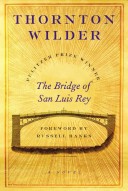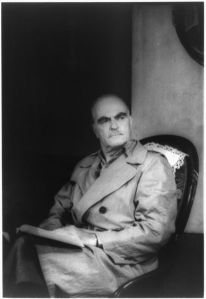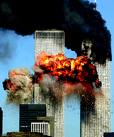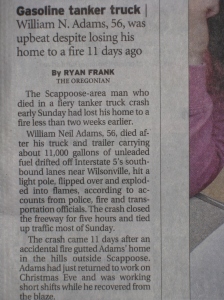On 9-11, Thornton Wilder, The Existence of God & The Tragic Death of an Oregon Trucker
December 29, 2008
 “On Friday noon, July the twentieth, 1714, the finest bridge in all Peru broke and precipitated five travelers into the gulf below.” This is the first sentence in Thornton Wilder’s classic tale The Bridge of San Luis Rey a book about the collapse of a rope suspension bridge, the death of the people on it and the journey of Brother Juniper, the only witness to the event, who sets out to prove that divine intervention not chance led to the tragic accident.
“On Friday noon, July the twentieth, 1714, the finest bridge in all Peru broke and precipitated five travelers into the gulf below.” This is the first sentence in Thornton Wilder’s classic tale The Bridge of San Luis Rey a book about the collapse of a rope suspension bridge, the death of the people on it and the journey of Brother Juniper, the only witness to the event, who sets out to prove that divine intervention not chance led to the tragic accident.
In an interview conducted with Wilder at the time the book was published he explained that the story was inspired by: “a one-act play by [the French playwright] Prosper Merimee, which takes place in Latin America

Thornton Nevins Wilder
After the World Trade Center towers were destroyed by airplanes acting as bombs on September 11, 2001, everyone scrambled to make sense of the terrible American tradgedy. CBS, NBC, ABC, CNN, Fox News and more played and replayed the video shot from a shaky camcorder of the planes  attacking the towers, angry red and orange flames consumed one tower then another and a tornado of black smoke pulled a blackout curtain across the jagged New York City skyline.
attacking the towers, angry red and orange flames consumed one tower then another and a tornado of black smoke pulled a blackout curtain across the jagged New York City skyline.
2,974 men and women got up that morning and rode the elevators up the north and south towers, took the metro to the Pentagon or boarded taxis to the airport for what should have been just another ordinary day in September. By COB (close of business) all were dead.
I remember a thoughtful reporter on NPR quoting a passage from Wilder’s The Bridge of San Luis-Rey and using that story as a jumping off point for trying to put into perspective or make sense of the seemingly senseless deaths of so many people. Of trying to understand why one particular person made it out of the tower and another did not. Why, on that one particular day, a traveler missed his flight by three minutes due to a train stalled out on a track outside of Logan Airport and another made it safely aboard. Why did some live and others die? No one, except perhaps the Pope or Rick Warren and his followers feel confident that they have an answer. The rest of us are left with questions and, as Wilder notes, “we can only pose the question’ correctly and clearly, and have faith one will ask the question in the right way.”
I woke up this morning and unfolded The Oregonian newspaper for a quick read before work. My eyes were immediately caught by an article on the front page with a headline proclaiming: Nicest Guy Dies in Fiery I-5 Crash.
 It wasn’t just that someone had died, it was that the nicest guy had died. And, as I read further down the page, I discovered that not only had William Adams, age 56, died in a fiery crash but that the crash had occurred just 11 days after his house was destroyed in a fire.
It wasn’t just that someone had died, it was that the nicest guy had died. And, as I read further down the page, I discovered that not only had William Adams, age 56, died in a fiery crash but that the crash had occurred just 11 days after his house was destroyed in a fire.
And I thought immediately of 9-11 and The Bridge of San Luis Rey and I couldn’t help but wonder if this very nice man had somehow escaped his first fiery death only to have it consume him less then two weeks later.
Death does not like to lose, in fact a reading of history assures us that Death will always win. We all get to shake hands with death; it is the reason the first snowdrop of spring and a glimpse at a lover’s sweetly sleeping face become both fragile and profound. Through death we find life and, ultimately, through life we meet death.
If I were a little less agnostic and a little more traditionally religious, I might believe that William Neil Adams had an appointment with destiny: hot, glowing, explosive, destiny. I would say that Death climbed into the cab of Mr. Adam’s truck one cold, rainy morning in December on an empty stretch of Interstate 5 in a rig filled with 10,000 gallons of unleaded gasoline and that together they drove into the sun.
But, as Wilder did in his classic novel of fate and chance, I also must ask the question: “Was this meant to be, or did Mr. Adams simply fall asleep at the wheel?”
December 31, 2008 at 12:34 pm
Very nice. I like the way you ended it. Kind of like “sex in the city” Bradshaw but very much your own voice. I like the form of 3 stories and connecting them. Again very clear and paced just right for an after-lunch read.
December 31, 2008 at 12:48 pm
what a lovely assessment of the post. i’m glad that the through-line between stories made sense and that you enjoyed it along with your pizza or brian’s bowl!